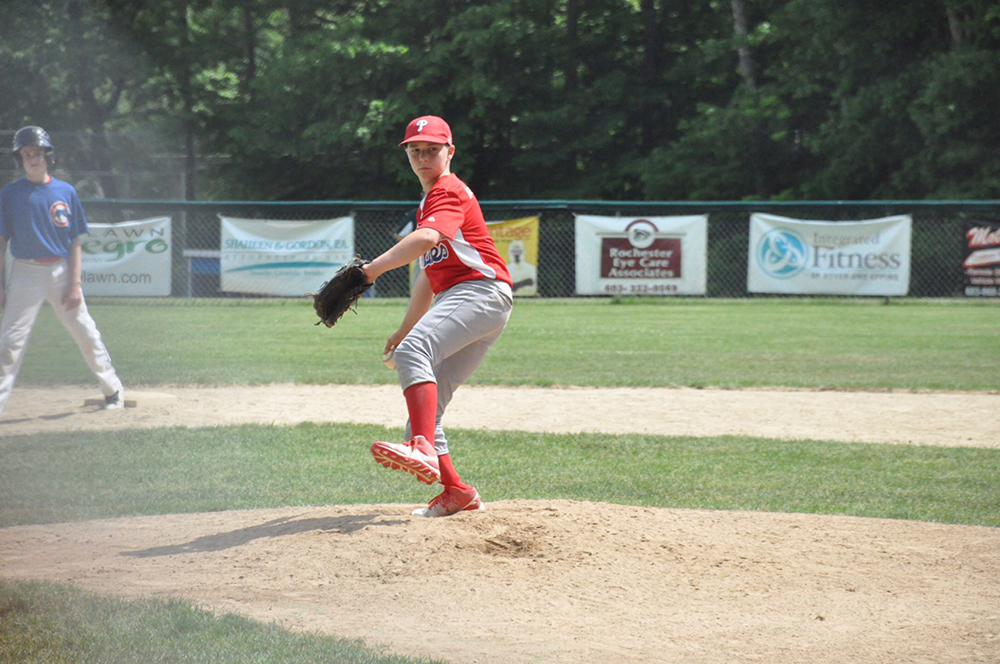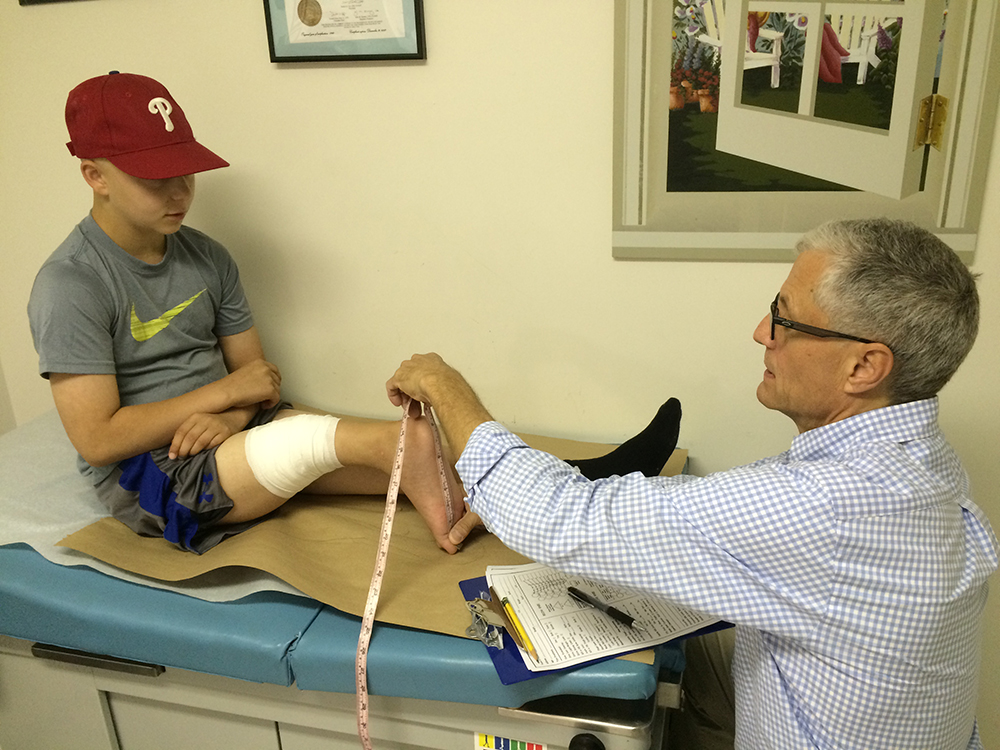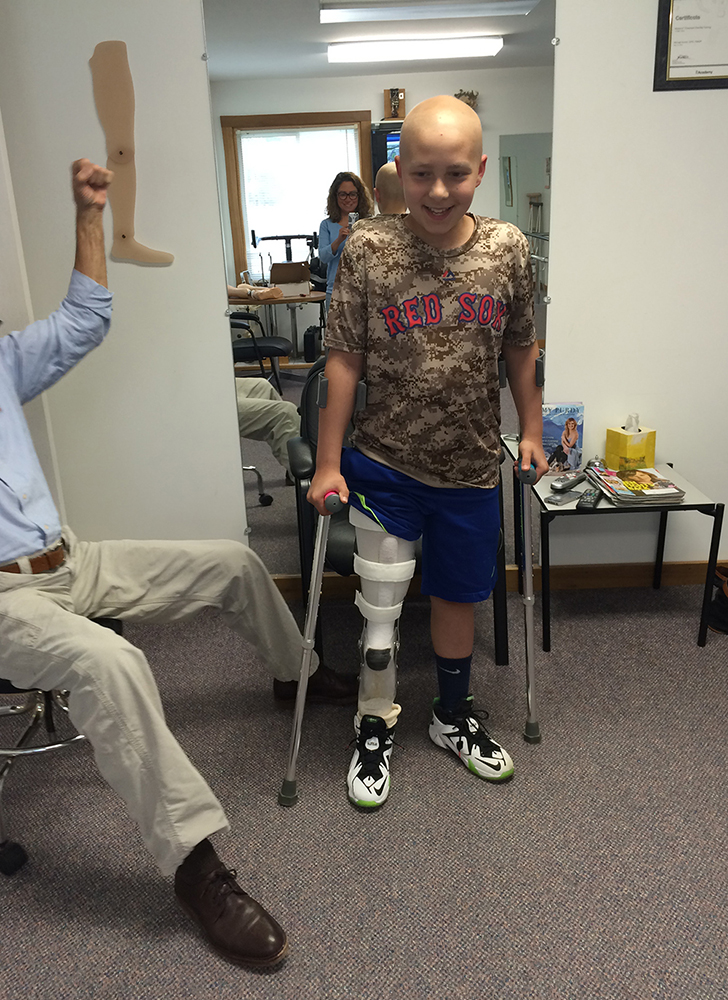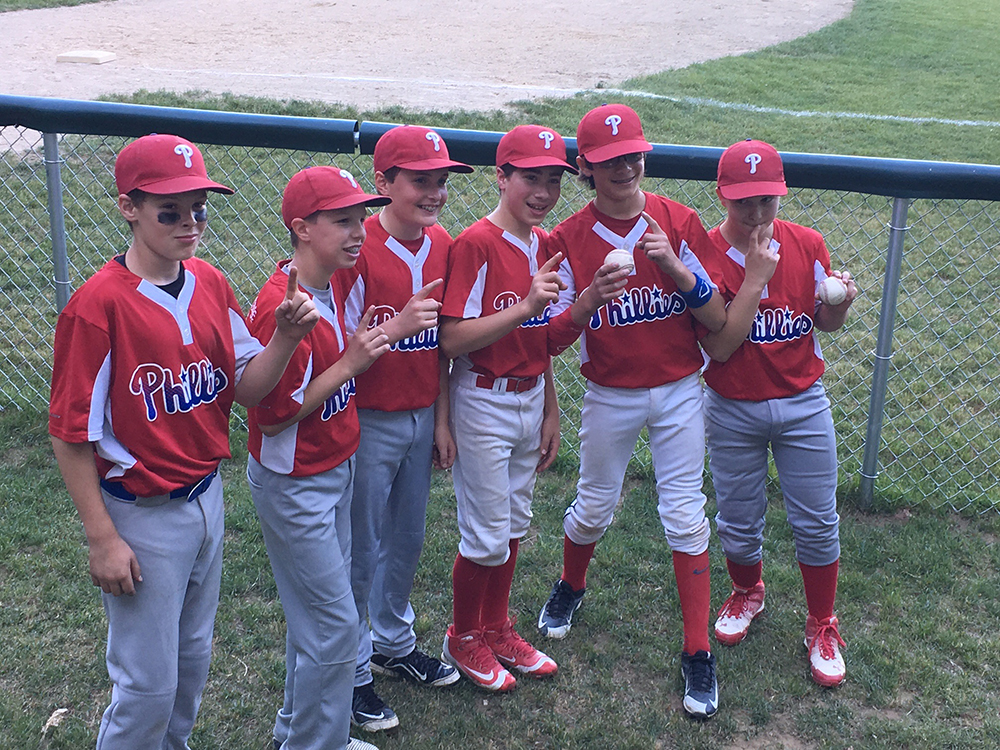
The ball leaps off the metal bat with an unmistakable “ping” that denotes good contact. Miles Goldberg runs to first base, from which the 13-year-old will soon contemplate – and safely execute – a steal of second.
Miles is used to transitioning naturally with the seasons from football to hockey to baseball. This year, however, has been different. Every hit, catch, and glide across the ice has had far more meaning to the eighth-grader, who recently completed osteosarcoma treatment at Dana-Farber/Boston Children’s Cancer and Blood Disorders Center.

His treatment included a wide resection of his right proximal tibia in June 2015 that resulted in the loss of most of his right leg bones and part of his thigh bone. Miles is able to move more freely on a prosthetic thanks to an innovative surgery called rotationplasty, which is an option for some Dana-Farber/Boston Children’s patients with osteosarcoma whose cancers require very wide surgical resections.
In the procedure, Miles’ lower right leg and foot were rotated and attached to his thigh bone, so his ankle now functions as a new knee joint. The prosthetic leg is modified to slip over his reattached foot, and makes up for the difference in height with his left leg.
“There were several amputation options, but after I watched some videos about how much mobility you have with rotationplasty, and met some people who had it done, I knew it was for me,” says Miles. “I even met a kid who played varsity high school football and baseball after the same surgery.”

The thought of returning to high-contact sports was appealing, but getting back to playing shape was a major challenge – especially when Miles’ cancer metastasized and required two additional surgeries to remove tumors on his lungs. He wore a hydration backpack to his 12th birthday party, and physical therapy appointments to adjust to his prosthetic leg were scheduled around intensive chemotherapy treatments.
“Miles had to deal with issues surrounding post-operative recovery, in addition to chemotherapy side effects,” says Pediatric Hematology/Oncology fellow Nmazuo (Maz) Ozuah, MD, of Miles’ care team. “But that never deterred his smiles, jokes, and always very pleasant demeanor.”
Between the smiles, Miles pushed himself hard. Friends connected his parents, Jennifer and Matt, with Bill Stewart, who runs a sports performance training center near their New Hampshire home and is also the competitive sports program director at Northeast Passage, an organization that provides recreational and competitive sporting opportunities for physically impaired athletes. Stewart began working with Miles after his active treatment ended in November 2015, and soon had him on the ice and in the batting cage.

“We worked with his core, his hips, and his entire body – linking it all together,” says Stewart. “I wanted to keep his expectations in check, but anybody who meets Miles knows this kid has the potential to do anything he sets his mind to.”
That includes four-hit days on the baseball field this year, where it was assumed Miles would play less-mobile positions like first base – but where he has wound up excelling all over the diamond – even the pitcher’s mound.
“Every other week he does something that knocks our socks off,” Matt Goldberg says of his son. “His attitude keeps the rest of us positive and less worried.”
Still, Miles is realistic. He knows he’s no longer a fast enough skater to keep up with the best hockey players his age, so he’s planning to join a sled hockey team for lower-leg-impaired athletes of ages. Coached by Stewart, it practices at the University of New Hampshire about five miles from home. And although health complications during the summer – he’s doing better now – sidelined him from sports temporarily, he’s back on the field again.
This time in football.
“Miles started practicing with his team in August at a reduced pace, unsure how capable he’d be to participate in games,” says Matt Goldberg. “As it turns out, he’s a regular at nose guard, and carries the ball on occasion as a halfback. He has great support from his coaches and teammates, shaping his meaningful participation.”
He also continues to have dreams.
“I’m thinking of trying out for quarterback,” says Miles. “I have a pretty good arm, and I’m mobile.”

You are an inspiring and brave athlete, Miles, and a reason to smile for Red Sox fans forced to watch two other teams in the World Series — with too many former Boston connections! Best of luck in football.